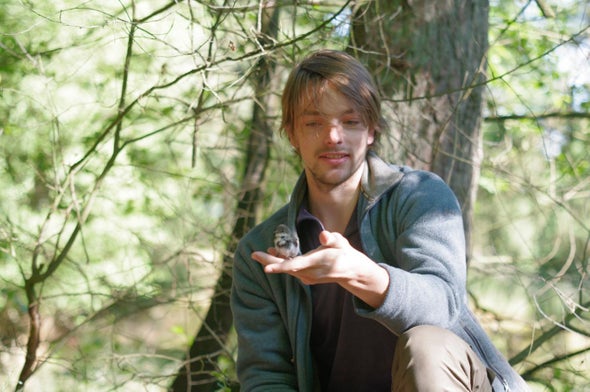(单词翻译:单击)
听力文本
This is Scientific American — 60-Second Science. I'm Christopher Intagliata.
Birds in Europe have the same problem as residents of cities like New York and L.A.: a housing crisis. Not enough nest space to go around. For a species called pied flycatchers that migrate from west Africa, things can get deadly if they end up nesting in the wrong spot.
"There's no chance for them." Jelmer Samplonius is a climate change ecologist at the University of Edinburgh. He says the flycatchers face fearsome foes, in the form of bigger resident songbirds, called great tits. "The great tit basically splits open the skull at the back and eats the brain. That's the gist of it."
Samplonius and his colleague Christiaan Both recorded more than a decade's worth of those conflicts in nearly a thousand nest boxes in the Dutch countryside. They determined that warmer winters can boost resident great tit numbers — increasing the chance of flycatcher slaughter.

But warmer springtime temperatures can throw the two species' nesting times out of sync — actually reducing deadly conflict. In addition, over the past 30 years, male flycatchers seem to be arriving earlier and earlier, regardless of springtime temperature trends. In other words: "It's complex."
But the upshot is that conflicts between the birds are on the rise, when some of these shifting factors align. And when they do, as many as one in ten male flycatchers can die at the claws of great tits. The death tolls are in the journal Current Biology.
The bloodbath doesn't seem to be affecting the overall flycatcher population...yet. Perhaps because the victims are primarily males that arrival late, destined to fail at the mating game anyway. But Samplonius says if climate change increases the numbers of resident birds, the migrants could increasingly arrive at their breeding grounds, and find an eviction notice..., or worse, a literally head-splitting situation.
Thanks for listening for Scientific American — 60-Second Science. I'm Christopher Intagliata.
参考译文
这里是科学美国人——60秒科学。我是克里斯托弗·因塔利亚塔。
欧洲鸟类与纽约和洛杉矶等城市的鸟类面临着同样的问题:住房危机。即鸟儿的筑巢空间不足。对从西非迁徙来的“斑姬鹟”来说,如果它们最后在错误的地点筑巢,那可能会面临致命风险。
“他们没有机会。”爱丁堡大学的气候变化生态学家杰尔默·萨姆普洛涅斯说到。他说,斑姬鹟面临着可怕的天敌——被称为“大山雀”的体型更大的本地鸣鸟。“大山雀主要从斑姬鹟后面劈开其头骨,然后吃掉它们的大脑。这就是大山雀的攻击要点。”
萨姆普洛涅斯及其同事克里斯蒂安·博斯在10多年的时间里,记录了荷兰乡村近1000个巢箱中的斗争。他们断定,暖冬会增加定居大山雀的数量,同时也会加大斑姬鹟遭屠杀的几率。
但暖春气温会使这两种鸟的筑巢时间不同步——这实际上减少了二者之间的致命冲突。此外,在过去的30年里,无论春季气温趋势如何,雄性斑姬鹟的到达时间似乎越来越早。换句话说:“情况很复杂”。
但重点是,当这些变化因素共同发挥作用时,两种鸟之间的冲突就会上升。当它们发生冲突时,多达十分之一的雄性斑姬鹟会死在大山雀的爪下。斑姬鹟的死亡数量发表在《当代生物学》期刊上。
不过目前来看,大屠杀似乎还未影响到斑姬鹟的总体数量。也许是因为受害者主要是迟到的雄性斑姬鹟,反正它们肯定没机会进行交配了。但萨姆普洛涅斯说,如果气候变化增加了留鸟数量,那就会有越来越多的候鸟在抵达繁殖地时收到“驱逐通知”,或者更糟,陷入“脑袋断裂”的危险。
谢谢大家收听科学美国人——60秒科学。我是克里斯托弗·因塔利亚塔。
译文为可可英语翻译,未经授权请勿转载!
重点讲解
重点讲解:
1. end up 最终;结果;到头来;
If you don't know what you want, you might end up getting something you don't want.
如果你不知道自己想要什么,到头来你可能得非所愿。
2. out of sync 不协调;不同步;
These two different masters can cause the interfaces to become out of sync and difficult to debug and fix.
这种分歧会导致两个接口不同步,而且难于调试和修复。
3. in other words 换言之;换句话说;也就是说;
A common saying goes, "Knit the brows and you will hit upon a stratagem." In other words, much thinking yields wisdom.
俗话说:“眉头一皱,计上心来”。就是说多想出智慧。
4. be destined to do sth. (命中)注定的;一定的;
He feels that he was destined to become a musician.
他觉得自己注定会成为一名音乐家。


